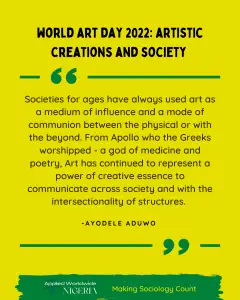In today’s world, social conflicts are inevitable and pervasive. They can arise from various sources, such as political, economic, cultural, religious, or ethnic differences. And they can have negative impacts on individuals, communities, and societies. Social conflicts can escalate into violence and aggression, which can cause human suffering, loss of life, destruction of property, and disruption of social order. Therefore, it is essential to find effective ways to prevent or reduce the occurrence and intensity of social conflicts. To promote peaceful and constructive resolution of disputes. One of the ways to achieve this goal is through sociological education.
Sociological education is a process of learning about the social world and its dynamics, using the concepts, theories, methods, and findings of sociology. Sociology is the scientific study of human social behavior, interactions, groups, and societies. It helps us understand the causes and consequences of social phenomena. Such as social conflicts and it offers insights and tools for analysing and addressing them.
The main purpose of this article is to explore the role of sociological education in building resilient societies. Resilient societies are those that can cope with and overcome various challenges and threats. These include natural disasters, pandemics, terrorism, and climate change. Resilient societies are also those that can enhance human well-being and security, which are the ultimate goals of sustainable development. The article will argue that sociological education can contribute to building resilient societies by facilitating conflict de-escalation, which is a process of reducing the level of hostility and tension between conflicting parties.

Sociological Education and Conflict De-escalation
Social conflicts are situations in which two or more parties perceive incompatible goals or interests, or have incompatible values or beliefs. Social conflicts can be classified into different types according to their sources or dimensions. For example:
- Material conflicts are those that involve tangible resources or goods, such as land, water, money, or power.
- Symbolic conflicts are those that involve intangible or abstract issues, such as identity, culture, religion, or ideology.
- Relational conflicts are those that involve interpersonal or intergroup relationships, such as trust, respect, or recognition.
Sociological education can help people understand the causes and consequences of social conflicts. This is done by providing them with a broader perspective on the social context and the historical background of the conflict situations. Sociological education can also help people recognize and challenge the stereotypes, prejudices, or biases that may fuel or sustain the conflict. Sociological education can also help people identify and evaluate alternative ways of resolving or transforming the conflict. Such as the use of negotiation, mediation, arbitration, or dialogue.
By enhancing people’s understanding of social conflicts, sociological education can facilitate conflict de-escalation. This is a process of reducing the level of hostility and tension between conflicting parties. Conflict de-escalation can involve various strategies, such as:
- Reducing negative emotions, such as anger, fear, or hatred, that may impair rational thinking or trigger impulsive actions.
- Increasing positive emotions, such as empathy, compassion, or gratitude, may foster mutual understanding or cooperation.
- Improving communication, such as listening, clarifying, or reframing, may reduce misunderstandings or misperceptions.
- Building trust, such as expressing sincerity, honesty, or respect, may enhance credibility or reliability.
- Seeking common ground, such as acknowledging similarities, shared values, or mutual interests, may create a sense of belonging or interdependence.
- Exploring differences, such as recognizing diversity, accepting pluralism, or appreciating uniqueness, may enrich learning or creativity.
- Promoting cooperation, such as collaborating, compromising, or integrating, may generate win-win solutions or mutual benefits.
Building Resilient Societies
Resilient societies are those that can cope with and overcome various challenges and threats, such as natural disasters, pandemics, terrorism, or climate change. Resilient societies are also those that can enhance human well-being and security, which are the ultimate goals of sustainable development.
Human well-being is a positive state experienced by individuals and societies. It encompasses quality of life and the ability of people and societies to contribute to the world with a sense of meaning and purpose. Human well-being is determined by social, economic, and environmental conditions, and it supports the tracking of the equitable distribution of resources, overall thriving, and sustainability.
Also, it is a condition in which people are free from fear, free from want, and free to live in dignity. It implies the protection of human rights and the empowerment of human capabilities. Human security is influenced by various factors, such as governance, justice, health, education, culture, and environment.
Resilient societies are those that can achieve and maintain high levels of human well-being and security in a complex and uncertain world. Resilient societies embrace diversity, adaptability, cooperation, innovation, and learning. They value and respect differences among individuals and cultures, which enhances their adaptability, creativity, and innovation. They adjust to changing circumstances, learn from experiences, and collaborate with others to achieve common goals.
They foster a culture of innovation, embracing change as an opportunity for growth. They prioritize education and lifelong learning, basing their decisions on evidence and continuously acquiring new knowledge and skills. This focus on diversity, adaptability, cooperation, innovation, and learning strengthens their resilience and ability to thrive in the face of challenges.
The Role of Sociological Education in Building Resilient Societies
Sociological education can contribute to building resilient societies by facilitating conflict de-escalation. Enhancing people’s understanding of social conflicts by providing them with skills and tools for preventing or reducing violence and aggression. Sociological education can help create a more peaceful and harmonious social environment. This in turn can improve human well-being and security by reducing human suffering, loss of life, destruction of property, and disruption of social order.
Sociological education can also contribute to building resilient societies by promoting the characteristics and features of resilient societies, such as diversity, adaptability, cooperation, innovation, and learning. Exposing people to different perspectives, cultures, and experiences, sociological education can help them appreciate diversity and embrace pluralism. If it provides them with a broader perspective on the social context and the historical background of social phenomena, sociological education can help them adjust to changing circumstances and cope with unexpected shocks.
It can encourage them to work together for common goals and mutual benefits. Sociological education can help them foster trust, solidarity, and reciprocity among themselves and with other actors. By stimulating their creativity, curiosity, and experimentation, sociological education can help them generate new ideas and solutions for existing or emerging problems. Fostering education, literacy, and lifelong learning among them, sociological education can help them acquire new knowledge and skills for personal or collective improvement.
Implications and Recommendations of Sociological Education for Policy Makers, Educators, Practitioners, and Researchers
Sociological education has important implications and recommendations for policymakers, educators, practitioners, and researchers who are interested in building resilient societies and facilitating conflict de-escalation. Some of these implications and recommendations are:
- Policymakers should support and invest in sociological education as a strategic tool for promoting peace and development. They should create and implement policies that encourage and enable sociological education in various sectors and levels of society, such as schools, universities, workplaces, communities, and media. They should also monitor and evaluate the impact and effectiveness of sociological education on human well-being and security.
- Educators should design and deliver sociological education that is relevant, engaging, and empowering for their learners. They should use participatory and experiential methods that allow learners to actively explore and reflect on social issues and conflicts. They should also provide learners with opportunities to apply their sociological knowledge and skills in real-life situations and contexts.
- Practitioners should use sociological education as a means of preventing or reducing violence and aggression in their fields of work. They should employ sociological concepts, theories, methods, and findings to analyze and address social conflicts. They should also facilitate dialogue, negotiation, and collaboration among conflicting parties using sociological skills and tools.
- Researchers should conduct rigorous and relevant research on sociological education and its impact on building resilient societies and facilitating conflict de-escalation. They should use mixed methods that combine quantitative and qualitative data to capture the complexity and diversity of social phenomena. They should also disseminate their research findings to various audiences and stakeholders to inform policy-making, education, practice, and further research.
Conclusion
This article has explored the role of sociological education in building resilient societies and facilitating conflict de-escalation. It has been argued that sociological education can contribute to building resilient societies by enhancing people’s understanding of social conflicts. And by providing them with skills and tools for preventing or reducing violence and aggression. It has also been argued that sociological education can promote the characteristics and features of resilient societies, such as diversity, adaptability, cooperation, innovation, and learning.
The article has also discussed the implications and recommendations of sociological education for policymakers, educators, practitioners, and researchers who are interested in building resilient societies and facilitating conflict de-escalation. It has also provided some suggestions for future research and practice on sociological education and conflict de-escalation.
By learning sociology, we can become more aware, more informed, more critical, more empathetic, more communicative, and more problem-solving citizens of the world. By applying sociology, we can become more effective, more constructive, more cooperative, more creative, and more resilient actors of change.
Therefore, let us embrace sociological education as a way of building resilient societies and facilitating conflict de-escalation. Let us learn sociology and use it for the benefit of ourselves and others. Let us make sociology matter.





